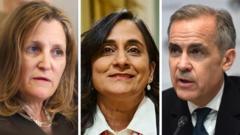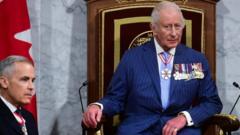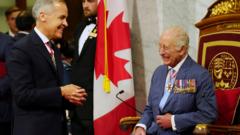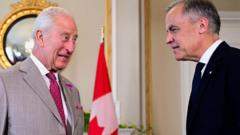With Trudeau stepping down, speculation is mounting about who could take the helm of the Liberal Party as it faces uncertainty ahead of the next election.
Who Will Succeed Trudeau as Leader of the Liberal Party?

Who Will Succeed Trudeau as Leader of the Liberal Party?
As Justin Trudeau announces his departure, a diverse lineup of potential successors emerges within the Liberal Party.
Justin Trudeau's nine-year tenure as Canada's Prime Minister has concluded with his announcement to resign as leader of the governing Liberal Party, prompting many to speculate about his potential successors. Polls indicate a challenging road ahead for the Party in the approaching general election, thus making the selection of a new leader critical.
Among the prominent names being discussed:
**Chrystia Freeland**: The former Deputy Prime Minister and current MP from Toronto, Freeland was previously regarded as one of Trudeau’s most trusted allies, though her public resignation in December raised eyebrows. An experienced politician, she has served as Minister of Foreign Affairs and Minister of Finance, gaining recognition for her response to the pandemic and her firm stance on international trade. Critics, however, describe her as either a beacon for liberalism or an out-of-touch idealist.
**Mark Carney**: A seasoned economist and former central banker, Carney has garnered attention for his high-level roles at the Bank of Canada and the Bank of England. While he lacks prior public office experience, he is a known figure in Liberal circles, having advised Trudeau and advocated for bold climate policies. His economic prowess may resonate with voters amid current financial challenges.
**Anita Anand**: Currently the Transport Minister, Anand is noted for her ambitious approach and battle against the COVID-19 pandemic as the Public Services and Procurement Minister. While she faced scrutiny during her time as Minister of Defence, she remains a formidable figure within the party and has built a reputation for decisive leadership.
**François-Philippe Champagne**: The Minister of Innovation and Industry, Champagne's experience in international trade and rapport within Quebec's political landscape position him as a key player in winning back centrist Liberal supporters. His enthusiasm and business acumen are cited as strengths.
**Mélanie Joly**: Since her appointment as Minister of Foreign Affairs in 2021, Joly has established herself on the global stage, advocating for Canada amidst international crises. A lawyer by training, she possesses strong networking skills and has expressed interest in leadership.
**Dominic LeBlanc**: Recognized as one of Trudeau's closest allies, LeBlanc’s longevity in politics and recent appointment as finance minister mark him as a political heavyweight. His personal history with Trudeau could also enhance his candidacy.
**Christy Clark**: The former Premier of British Columbia has indicated her intent to engage in leadership discussions. With a history of balancing environmental and energy needs during her tenure, Clark's aspirations reflect the ongoing evolution of the Liberal Party.
The contours of the Liberal Party leadership landscape are shifting, presenting an array of hopefuls from diverse backgrounds. As Canada prepares for an electoral battleground, the party must select a leader capable of unifying and steering its future amidst socio-political challenges.
Among the prominent names being discussed:
**Chrystia Freeland**: The former Deputy Prime Minister and current MP from Toronto, Freeland was previously regarded as one of Trudeau’s most trusted allies, though her public resignation in December raised eyebrows. An experienced politician, she has served as Minister of Foreign Affairs and Minister of Finance, gaining recognition for her response to the pandemic and her firm stance on international trade. Critics, however, describe her as either a beacon for liberalism or an out-of-touch idealist.
**Mark Carney**: A seasoned economist and former central banker, Carney has garnered attention for his high-level roles at the Bank of Canada and the Bank of England. While he lacks prior public office experience, he is a known figure in Liberal circles, having advised Trudeau and advocated for bold climate policies. His economic prowess may resonate with voters amid current financial challenges.
**Anita Anand**: Currently the Transport Minister, Anand is noted for her ambitious approach and battle against the COVID-19 pandemic as the Public Services and Procurement Minister. While she faced scrutiny during her time as Minister of Defence, she remains a formidable figure within the party and has built a reputation for decisive leadership.
**François-Philippe Champagne**: The Minister of Innovation and Industry, Champagne's experience in international trade and rapport within Quebec's political landscape position him as a key player in winning back centrist Liberal supporters. His enthusiasm and business acumen are cited as strengths.
**Mélanie Joly**: Since her appointment as Minister of Foreign Affairs in 2021, Joly has established herself on the global stage, advocating for Canada amidst international crises. A lawyer by training, she possesses strong networking skills and has expressed interest in leadership.
**Dominic LeBlanc**: Recognized as one of Trudeau's closest allies, LeBlanc’s longevity in politics and recent appointment as finance minister mark him as a political heavyweight. His personal history with Trudeau could also enhance his candidacy.
**Christy Clark**: The former Premier of British Columbia has indicated her intent to engage in leadership discussions. With a history of balancing environmental and energy needs during her tenure, Clark's aspirations reflect the ongoing evolution of the Liberal Party.
The contours of the Liberal Party leadership landscape are shifting, presenting an array of hopefuls from diverse backgrounds. As Canada prepares for an electoral battleground, the party must select a leader capable of unifying and steering its future amidst socio-political challenges.



















